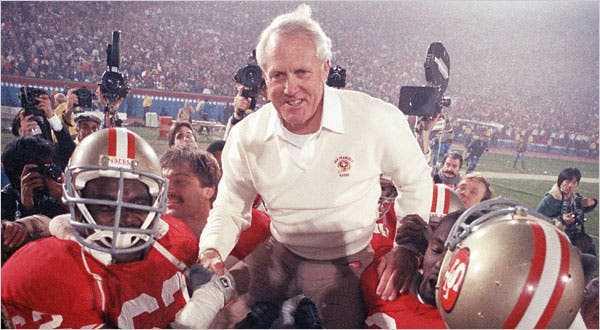Explore the World's Best Ideas
Join today and uncover 100+ curated journeys from 50+ topics. Unlock access to our mobile app with extensive features.
Team Success
Even with the greatest amount of talent possible, you can’t guarantee success for a team. But there are things you can do to increase the probability of success, and a great leader intelligently and ruthlessly seeks out solutions to increase that probability. And when you do, the score will take care of itself.
People who succeed in highly competitive environments have one thing in common, failure, and the ability to overcome it.
29
533 reads
What To Do For Getting Back In The Game
- Do expect defeat, if you’re surprised about ever getting defeated, you are deluding yourself.
- Do force yourself to stop looking backward and miring yourself in misery.
- Do allow yourself appropriate recovery time, but no more.
- Do tell yourself that you’re going to stand and fight again.
- Do begin planning for the next serious encounter.
30
259 reads
What Not To Do For Getting Back In The Game
- Don’t say “why me?”.
- Don’t expect sympathy.
- Don’t bellyache.
- Don’t keep accepting condolences.
- Don’t blame others.
30
264 reads
The Standards Of Performance
- Exhibit a ferocious and intelligently applied work ethic directed at continual improvement
- Demonstrate respect for each person in the organisation and the work he or she does
- Be deeply committed to learning and teaching, which means increasing your own expertise
- Be fair
- Demonstrate character
- Honour the direct connection between details and improvement, and relentlessly seek the latter
- Show self-control, especially where it counts most— under pressure
- Demonstrate and prize loyalty
28
120 reads
The Winning Game
- Use positive language and have a positive attitude
- Take pride in your effort as an entity separate from the result of that effort
- Be willing to go the extra distance for the organisation
- Deal appropriately with victory and defeat, adulation and humiliation.
- Promote internal communication that is both open and substantive (especially under stress)
- Seek poise in yourself and the team you lead.
- Put the team’s welfare and priorities ahead of your own
- Maintain an ongoing level of concentration and focus that is abnormally high
- Make sacrifice and commitment the organisation’s trademark.
29
89 reads
Taking Decisions
A leader must be keen and alert to what drives a decision, a plan of action. If it was based on good logic, sound principles, and strong belief, I felt comfortable in being unswerving in moving toward my goal. Any other reason (or reasons) for persisting were examined carefully.
Among the most common faulty reasons are:
- Trying to prove you are right and
- Trying to prove someone else is wrong.
Of course, they amount to about the same thing and often lead to the same place: defeat.
25
77 reads
There Is No Guarantee Or Ultimate Formula For Success
A resolute and resourceful leader understands that there are a multitude of means to increase the probability of success. And that’s what it all comes down to, namely, intelligently and relentlessly seeking solutions that will increase your chance of prevailing in a competitive environment. When you do that, the score will take care of itself.
25
75 reads
Survival Is Key
Pursuing your ambitions, especially those of any magnitude, can be grueling and hazardous, and produce agonizing failure along the way, but achieving those goals is among life’s most gratifying and thrilling experiences. The ability to survive and overcome the former to attain the latter is a fundamental difference between winners and losers.
25
65 reads
Perseverance
Here’s a short checklist worth keeping in mind when it comes to persevering, to doing it “your way” at all costs:
- A leader must never quit.
- A leader must know when to quit.
- Proving that you are right or proving that someone is wrong are bad reasons for persisting.
- Good logic, sound principles, and strong belief are the purest and most productive reasons for pushing forward when things get rough.
No one can control the outcome of a contest or competition, but you can control how you prepare for it.
25
58 reads
The Action And The Attitude Of A Leader
An organisation is not just a tool like a shovel, but an organic entity that has a code of conduct, a set of applied principles that go beyond a company mission statement that’s tacked on the wall and forgotten.
Great teams in business, in sports, or elsewhere have a conscience. At its best, an organisation—your team—speaks values and a way of doing things that emanate from a source; that source is you—the leader. Thus, the dictates of your personal beliefs should ultimately become characteristics of your team.
26
54 reads
A Leader's Inner Voice
- We can win if we work smart enough and hard enough.
- We can win if we put the good of the group ahead of our own personal interests.
- We can win if we improve. And there is always room for improvement.
- I know what is required for us to win. I will show you what it is.
28
57 reads
Innovation, Planning And Common Sense
- Success doesn’t care which road you take to get to its doorstep.
- Be bold. Remove the fear of the unknown—that is, change—from your mind.
- Respect the past without clinging to it: “That’s the way we’ve always done it” is the mantra of a team setting itself up to lose to an organisation that’s not doing it that way anymore.
- Desperation should not drive innovation.
- Be obsessive in looking for the upside in the downside.
26
57 reads
A Win Or A Loss Does Not Matter
- Don’t mistake activity for action.
- It’s not about if you lose or win, it’s about how.
- Concentrate on what will produce results rather than on the results, the process rather than the prize.
- Exhibit an inner toughness emanating from four of the most effective survival tools a leader can possess: expertise, composure, patience, and common sense.
- Maintain your level of professional ethics and all details of your own Standard of Performance.
- Don’t isolate yourself. Keep in mind that as troubles mount, your relationships with personnel become even more critical.
27
54 reads
Taking Up The Challenge
- Don’t let the magnitude of the challenge take you away from the incremental steps necessary to effect change. Continue to be detail-oriented.
- Exude an upbeat and determined attitude. Never, ever express doubt, but avoid an inappropriate sunny optimism in dark times.
- Don’t plead with employees to “do better.”
- Avoid continual threatening or chastising.
- Deal with your immediate superior( s) on a one-to-one, ongoing basis.
26
55 reads
"Failure is part of success, an integral part. Everybody gets knocked down. Knowing it will happen and what you must do when it does is the first step back."
BILL WALSH
24
51 reads
Mistakes And Defeat
When you make a mistake, admit it and fix it. Don’t let pride, stubbornness, or possible embarrassment about your bad decision prevent you from correcting what you have done. Fix it, or the little problem becomes a big one.
One of the common traits of outstanding performers—coaches, athletes, managers, sales representatives, executives, and others who face a daily up/down, win/lose accounting system—is that a rejection, that is, defeat, is quickly forgotten, replaced eagerly by pursuit of a new order, client, or opponent.
26
43 reads
"Sometimes you snarl; sometimes you bite; sometimes you smile and give a thumbs-up. There’s a little bit of the actor in all good leaders."
BILL WALSH
26
54 reads
IDEAS CURATED BY
CURATOR'S NOTE
Bill Walsh’s memoir on leadership is excellent even if you know nothing about football.
“
Matthew Clark's ideas are part of this journey:
Learn more about books with this collection
How to create a positive work environment
Techniques for cultivating gratitude and mindfulness at work
How to find purpose in your work
Related collections
Discover Key Ideas from Books on Similar Topics
2 ideas
Why Do We Gesture When We Talk?
mentalfloss.com
10 ideas
Let's stop calling them 'soft skills'
itsyourturnblog.com
8 ideas
Seth Godin - How to Get Your Ideas to Spread - Nordic Business Forum
Nordic Business Forum
Read & Learn
20x Faster
without
deepstash
with
deepstash
with
deepstash
Personalized microlearning
—
100+ Learning Journeys
—
Access to 200,000+ ideas
—
Access to the mobile app
—
Unlimited idea saving
—
—
Unlimited history
—
—
Unlimited listening to ideas
—
—
Downloading & offline access
—
—
Supercharge your mind with one idea per day
Enter your email and spend 1 minute every day to learn something new.
I agree to receive email updates

